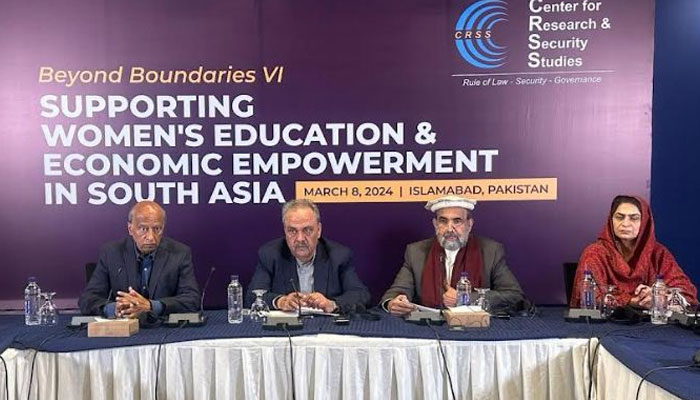‘Mutual respect for sovereignty key to stable Pak-Afghan ties’
Islamabad : Asif Durrani, Pakistan’s Special Representative on Afghanistan, has said that refusal of Afghans to cross into Pakistan with a passport defies the logic of relations between two sovereign countries.
Mr Durrani said this during his interaction with the Afghan religious, tribal, and business stakeholders, while highlighting the security threats posed by Tehreek-e-Taliban Pakistan (TTP) and the detrimental effects of their activities on Pakistan's security.
The interaction was part of 3-day Pak-Afghan Stakeholders Conference organised by Center for Research and Security Studies (CRSS) in collaboration with its Afghan partner Organisation for Economic Studies and Peace (OESP), as part of their initiative Beyond Boundaries.
Mr Durrani said that cooperation is needed in countering terrorism (CT) efforts and promoting peace in the region. He observed that terrorist groups like Daesh (ISIS) pose a threat not only to Afghanistan but also to the wider region and the world. He called for collective efforts to combat terrorism and promote sustainable regional peace.
The envoy emphasised the importance of documentation such as passports and CNICs for security purposes. He advocated the necessity of implementing biometric measures for border cross-border movement of people to bolster security and minimise threats from non-state actors.
He stressed the need for mutual respect for sovereignty between Pakistan and Afghanistan. He refuted the perception of Pakistan using coercion in its dealings with Afghanistan and said the refusal of Afghans to cross into Pakistan with a passport defies the logic of relations between two sovereign countries.
Mr Durrani accused external actors, particularly India, of supporting TTP militants, citing evidence of their involvement and wanted to address the issue of the militant outfit’s funding and external support.
He expressed Pakistan's commitment to ongoing discussions with Afghanistan and assured that efforts were underway to address existing challenges and achieve positive outcomes.
He said that the scholarships provided by the Pakistani government to Afghan students provide equal educational opportunities to them in Pakistan. He mentioned that 4,500 scholarships were announced for Afghan students under the Allama Muhammad Iqbal Scholarship program with 1,500 dedicated to Afghan women, covering various fields of study for a duration of up to five years.
Afghan students underscored that they should be given opportunities for internships in Pakistan equip them with practical hands-on experience and enable them to apply the acquired skills in their home communities.
Concerns were raised regarding the accreditation of online schools and the recognition of degrees obtained from them. Mr Durrani opined that degree recognition falls under Afghanistan's jurisdiction and suggested that these matters should be addressed internally by the Afghan government.
The requirement of a mahram (male guardian) for female students to cross the border was discussed with the envoy who advised them to plan accordingly and bring a mahram when necessary. He emphasised the importance of adhering to visa procedures and regulations.
-
 Kate Middleton Proves She's True 'children's Princess' With THIS Move
Kate Middleton Proves She's True 'children's Princess' With THIS Move -
 Paul Anka Reveals How He Raised Son Ethan Differently From His Daughters
Paul Anka Reveals How He Raised Son Ethan Differently From His Daughters -
 'A Very Special Visitor' Meets Queen Camilla At Clarence House
'A Very Special Visitor' Meets Queen Camilla At Clarence House -
 Jodie Turner Smith Shares One Strict Rule She Follows As A Mom
Jodie Turner Smith Shares One Strict Rule She Follows As A Mom -
 Hailey Bieber Reveals KEY To Balancing Motherhood With Career
Hailey Bieber Reveals KEY To Balancing Motherhood With Career -
 Photo Of Jay-Z, Other Prominent Figures With Jeffrey Epstein Proven To Be Fake
Photo Of Jay-Z, Other Prominent Figures With Jeffrey Epstein Proven To Be Fake -
 Hillary Clinton's Munich Train Video Sparks Conspiracy Theories
Hillary Clinton's Munich Train Video Sparks Conspiracy Theories -
 Fans Slam Talk Show Host For 'cringe' Behavior In Chris Hemsworth Interview
Fans Slam Talk Show Host For 'cringe' Behavior In Chris Hemsworth Interview -
 Woman Jailed Over False 'crime In Space' Claim Against NASA Astronaut
Woman Jailed Over False 'crime In Space' Claim Against NASA Astronaut -
 James Van Der Beek’s Close Pal Reveals Family's Dire Need Of Donations
James Van Der Beek’s Close Pal Reveals Family's Dire Need Of Donations -
 Prince William And Harry's Cousins Attend 'Wuthering Heights' Event
Prince William And Harry's Cousins Attend 'Wuthering Heights' Event -
 Hailey Bieber Turns Heads Just Hours After Major Business Win
Hailey Bieber Turns Heads Just Hours After Major Business Win -
 King Charles' Andrew Decision Labelled 'long Overdue'
King Charles' Andrew Decision Labelled 'long Overdue' -
 Timothee Chalamet 'forever Indebted' To Fan Over Kind Gesture
Timothee Chalamet 'forever Indebted' To Fan Over Kind Gesture -
 Columbia University Sacks Staff Over Epstein Partner's ‘backdoor’ Admission
Columbia University Sacks Staff Over Epstein Partner's ‘backdoor’ Admission -
 Ozzy Osbourne's Family Struggles Behind Closed Doors
Ozzy Osbourne's Family Struggles Behind Closed Doors




